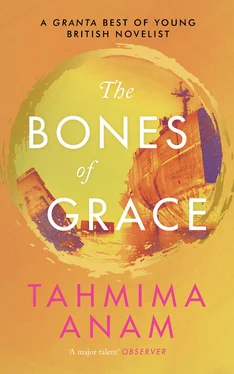‘Hello,’ I said, inhaling your shoulder, the hair tucked behind your ear.
We had to walk side by side for a long time until the divider ended. Then you pointed to one of the plastic chairs. ‘Let’s sit here for a moment. Hello.’ You took both my hands and pressed them together between your palms. I was aware of the size of you, of your physical presence that seemed to make everything else shrink. I pulled my hand away, knowing people would stare, and when I tried to look down at the floor, which was littered with cigarette butts, your eyes followed me. ‘Hello,’ you said again.
We remained on the plastic chairs for a few minutes, not speaking. I passed you a bottle of water and you twisted off the cap and held it for a while before taking a sip. Then you straightened, and said, ‘I wasn’t going to come. I almost turned around at the airport and went home.’
At this moment, Mr Ali walked past us. I stood up and introduced you. He had come to pick up another potential buyer, after the first one, Mr Reza, had commissioned most of equipment on Grace , leaving behind the electrical appliances, the furniture, and the piano. You shook hands. My attention drifted for a moment, then I heard you saying, ‘And thank you for allowing me to visit your ship.’
‘Oh, you are seeing the Grace . Miss Zubaida did not tell me.’
I had wanted to bring it up with Ali slowly, once he’d gotten used to the idea of having you around. ‘Sorry, Mr Ali — I hope it’s all right,’ I said. ‘My friend is a pianist, so I thought he might like to see the instrument on Grace .’
‘Yes, yes of course. You are most welcome,’ Ali said, holding his hands behind his back. ‘But you must give me some time to organise the visit.’ I said of course we would wait for his permission. It was his ship, after all.
I had considered meeting you in Dhaka and showing you the sights: Louis Khan’s parliament building, full of sharp, grey angles, or the bank of the Buriganga, which had once given Dhaka the ambition of calling itself the Venice of the East; and more personal landmarks, the graveyard where my grandfathers were buried, the fancy school I was admitted to when we moved to Gulshan, but I had decided to meet you in Chittagong instead. When I think about it now, it seems unlikely I would have urged you to visit if I had remained in Dhaka, married or not. It was only in this third place that our meeting, and all that followed, was possible.
We stepped into the heavy damp of the morning, pushing through the crowd until we reached the car. I watched you put your bags into the trunk, and you slipped beside me into the hush of the back seat.
‘Thank you,’ I said. ‘For coming in the end. For not turning around.’ And then, because I didn’t know what else to say, I asked, ‘Did you watch any movies on the plane?’
You pulled a book out of your shoulder bag. Anna Karenina .
I realised, at that moment, that you were always going to come, that you had been waiting, all these months, for my invitation.
The car was held up on the link road out of the airport. You rolled down the window and let the air in, thick and warm. A train, painted a long time ago in ivory and blue, clattered past, passengers standing between the carriages and leaning through the bars on the windows. The car moved and you closed the window.
‘A lot of things happened,’ I said.
‘You got married.’ Your voice was flat.
‘I did. I did.’
The car lurched to a stop again on the turning to Chittagong town. I wanted to sound an apology for rushing into the alliance with Rashid, but if I started apologising I might not be able to stop; I might go on and say sorry for the shabby look of my country, the tacky billboards advertising halal soap and mobile phones and air conditioning, the tangle of the telephone wires that hung between poles on the side of the road, the roads themselves, narrowed by trash and people braiding their edges with their hands out, showing off the empty spaces where their limbs should have been, and the air itself, its smell and texture, heavy with missed chances, everything chipped and messy and never quite beautiful, and I would say sorry for not waiting for you, for not believing in our few days together and assuming it was nothing to you, but if I did that, I would not be able to stop and we would begin and end with nothing but a string of sorrys, and that was precisely why I did not want to be your lover, because everything about my life seemed poor when I looked at it through your eyes.
Instead I sat back in my seat, waiting for the traffic to clear so I could point out some of the landmarks on the way.
As we stopped on the main Chittagong roundabout, I thought about Boils Man, and hoped he wouldn’t show up today. Not because you wouldn’t be able to handle it, the sight of a naked man with small tumours protruding from every inch of his body, but because you would have to see me turn my face away and refuse to look at him, which would tell you too much — everything, really, about my place in this world.
We stopped, the lights changed, horns blaring behind us.
‘Tell me again what happened with your trip to Pakistan,’ you said.
As I recounted the story I felt acutely the distance between the moment I had said goodbye to you in Boston, and this moment, all the things that had crowded into those months coming back to me in a rush. Sitting there in the traffic, I felt that Ambulocetus couldn’t be further away, and when I had been picking at the red sequence in the shale of the Tethys, Cambridge and Shostakovich were only distant memories, and that night when I met you, it was as if my long history with Rashid had never taken place. Every episode of my life seemed to exist in its own articulated space. I wondered what would have happened if I hadn’t started thinking about my adoption, if I hadn’t met you that evening, if Zamzam hadn’t been Didag Baloch’s son. I had always told myself that marrying Rashid was an inevitability, but so much had happened to frame that event, so much before and so much after — Prosperity and Grace and the pulling crew — that it didn’t seem possible that they weren’t all occurring as a result of one another.
On the way home, I thought about my dadu, my father’s mother. Her name was Mehrunessa Bashir and she was born in a village in Trishal, in Mymensingh District, the fourth of seven children. Her father, a munshi, taught her how to read and write, but, though they weren’t poor, no one expected Mehrunessa to remain unmarried past puberty. When she married my grandfather she was thirteen and he was twenty years older, already a practising lawyer. It wasn’t until a decade into their marriage that Mehrunessa showed herself to be an exceptional wife. She demonstrated frugality in the administration of the household expenses, spreading the small sum my grandfather brought home every month to stretch between five sons and the various relations who came to live with them. She oversaw the purchase of a small plot of land in the town and moved the family there so that her boys would not have to grow up in the village, where school ended once help was needed in the fields. A few years later, she insisted they move to the capital, even though they could not afford it at the time, and, for the first few years, when her husband’s clients were few and far between, Mehrunessa found ways to ride out the lean. My grandfather then became well known for a case he fought against a corrupt judge of the Dhaka High Court, becoming the first Bengali lawyer to successfully sue a British lawmaker. The memoir he wrote of that trial, Amar Shikha , was transcribed and typeset by Mehrunessa, who had an eye for typographic detail that her husband lacked. My grandfather died of liver cancer a few months before the war, so he did not witness the destruction and rebirth of the country. He was not there to bury his youngest son, a revolutionary felled by an enemy bullet, his body carried for miles by his fourth son, my father, and buried in an unmarked grave near the village he helped to liberate. He was not there to see the expansion of the family’s fortunes, not there to witness his eldest son become a successful barrister, the house growing to two, then three storeys, and he didn’t see the arrival of the film star Shalaila Mehndi, or the marriage of his other sons and the birth of their children, or the arrival of me from an unknown woman’s arms. That was all Mehrunessa, growing severe in her old age, as if there was work yet to be done, children yet to raise, boys yet to be turned into men. All her life she had brought my grandfather his morning tray and placed it on the table by his bedside so that the smell of simmering tea would wake him up, and she had watered down his dal so that he could afford it at every meal, and she had made sure his shirts were ironed and his children washed and sent to school, and in every way that can be counted, she was ordinary, doing the things that wives do, resolute, undeterred, a woman made entirely of her time and age, and in this simplicity, she was her own life’s magician.
Читать дальше












